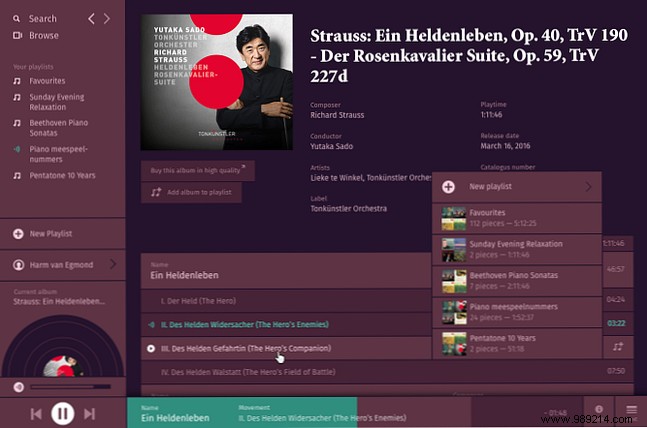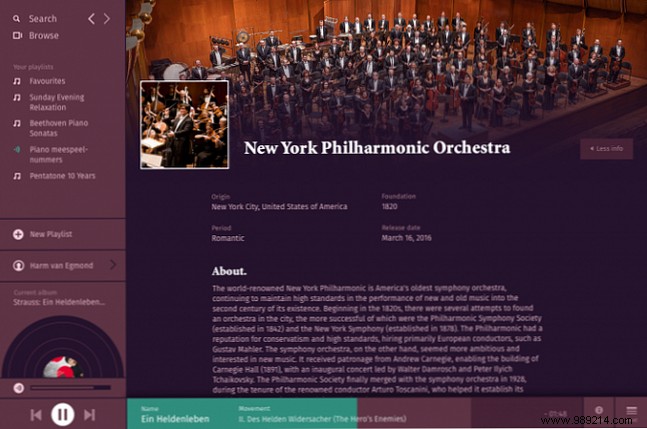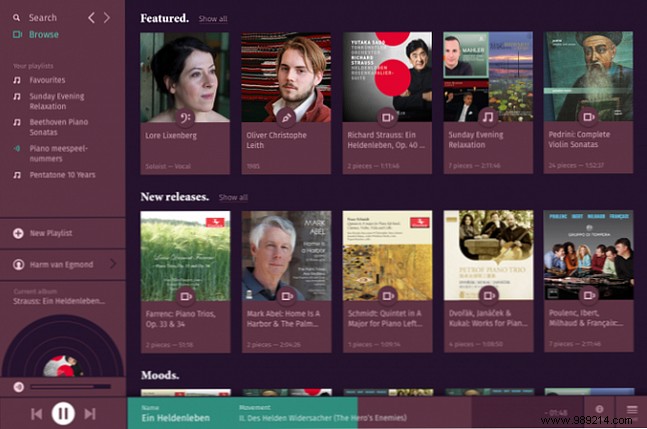Classical music is the oldest surviving form of music in the world. Remarkably, experts believe it can draw a direct line from today's postmodern classical music to its roots in 2695 BC and the ancient Egyptian orchestra.
Considering its age and enduring popularity, it's perhaps surprising that classical music is the "forgotten genre" of major streaming services Spotify vs. Apple Music vs. Amazon Music Unlimited:Which is the best? Spotify vs. Apple Music vs. Amazon Music Unlimited:Which is the best? With the introduction of Amazon Music Unlimited, now is a great time to sign up for a streaming music service. In this article, we'll examine how Amazon's service compares to Spotify and Apple Music. Read more.
Well not yet. If you are a fan of classical music, you should be happy right now. Because now you can enjoy your favorite tracks on a brand new streaming service called Primephonic.
What is primephone? What benefits does it offer? And how does it compare to Spotify and Google Play Music? Read on to find out.
First of all, let's make something clear. Classical music en available on Spotify, Google Play Music, Tidal, and every other popular streaming app you can think of. It always has been and always will be.
However, there is one problem that it will try to deal with classical music on those services:the metadata.
How can you force moves, compositions, multiple recordings, performer, composer, director, and everything else into the highly restrictive artist/song/album fields you find on most streaming apps? You can't.

Let's take a simple example. How would you find Carlos Kleiber's version of Beethoven? 5th symphony Performed by the Vienna Philharmonic Orchestra on Spotify? Whose Spotify list would be as an artist? Beethoven, Kleiber, or the orchestra? And what about a classic track that also features operatic vocalists? Where are they included?
Aside from rewriting the entire app, there's not much the vendors can do about this gender-specific issue. The result is that classical music fans are locked in a never-ending battle with miscategorized music, hard-to-find tracks, and impossible-to-navigate playlists.
As of June 2017, there is a new app in town. Called Primephonic, it aims to solve the classic conundrum with a service dedicated exclusively to the genre.
Of course, if you're a fan of classical music, you may still encounter metadata errors. How To Edit Your Music's ID3 Tags With Audioshell How To Edit Your Music's ID3 Tags With Audioshell Read more, but it should be a lot less. Among. Primephonic enlisted the help of six musicologists (yes, that's a real job) to meticulously check and complete the metadata for over 100,000 classical tracks.

Speaking to Billboard, Primephonic co-founder Simon Eder said classical music fans needed more ways to find the content they care about:
Eder goes on to describe classical music history as “a kind of skeleton or tree” that Primephonic is adding albums to. The more information the company adds, the more accurate the metadata will be.
“We are putting all the information about the composer, artists and albums, and attaching them to the corresponding arm of the tree. That is an approach that is not relevant for an all-in-one streaming provider,” Eder concluded.
Primephonic's music library is vast. It has 100,000 tracks, 6472 artists and 234 record labels..
The library was significantly upgraded just a week before release, when Primephonic managed to strike a deal with Warner Classical and Sony Classical for all of their post-1950 catalogues. Considering those labels are home to modern classic stars like Vanessa Mae, Conrad Tao and Joyce Didonato, as well as world-renowned orchestras such as the Orchester National de France, the Royal Opera House Orchestra and the BBC Philharmonic Orchestra, it was a huge hit.

Primephonic also has agreements with Naxos, Harmonia Mundi, Chandos, Bis and 2L, among others.
If you sign up and can't find the album you want, please be patient. Because the metadata is added manually (at the rate of 200 albums per day), Primephonic says it will take at least three months for all of their music to be fully available.
Naturally, you will also find thousands of royalty-free songs. This music is already widely available on free classical music sites like Musopen (which is also great for sheet music) Top 7 Sites To Find And Print Free Sheet Music Top 7 Sites To Find And Print Free Sheet Music Have you been looking for a free printable sheet? music? Here are seven amazing resources to give you a hand. Read More
Primephonic shines in the quality of its audio. Unlike Spotify and YouTube, it offers all your music in CD-quality 16-bit FLAC.
It may not sound important, but it is. The difference between a lossy and a lossy 10 common audio formats compared:which one should you use? 10 Common Audio Formats Compared:Which One Should You Use? We may all be familiar with MP3, what about AAC, FLAC, OGG or WMA? Why are there so many standards? Which ones should you be interested in and which ones can you ignore? Read more version of Richard Wagner's famous opera The Ring It's much more noticeable than Justin Bieber's last hit. For fans of classical music, this is a very welcome feature.
Because Primephonic has built its library and metadata from the ground up, it offers a number of innovative classical music-focused features that you won't find on other streaming services.
For each artist on the platform, Primephonic has created an encyclopedia entry.
Yes, Spotify and the rest offer something similar, but it's only available to particular artists. You'll only find lengthy biographies if the artist in question is a historical superstar or a current Top 40 pop star. Unfortunately, few classical artists meet these requirements.

However, in Primephonic, no matter how obscure the artist is, you will be able to see certain information. For the most famous composers in history, you'll find detailed summaries, like a Wikipedia entry. As you might expect, the encyclopedia entries include links to songs.
It seems that the encyclopedia is simply a precursor to what will be one of the salient features of the service:a way to give classical musicians a broader profile.
In addition to the streaming service, Primephonic also offers a music store. Offers the two new releases. Top 8 websites to check out new music releases first. Top 8 websites to check out new music releases first. Here are eight websites to check out new music releases as they happen. Read More For example, you will find the latest news from RIOPY. Drive album with Bach:Celebration Cantatas .
Various filters are available, including Audio Quality, Label, Composer, Conductor, and Orchestra, allowing you to refine your search to find exactly what you want.

For each album, you can purchase the entire recording or the individual songs on a track-by-track basis. Subscribers to the streaming service receive a 10 percent discount on all purchases.
First of all, if you're outside of the US or UK, that's bad news. You won't be able to stream music yet. You can fill in your details on your account page to be notified when service is available in your area.
Assuming you are in the US or USA, Primephonic offers a 30-day free trial for all users. Signing up for the trial gives you full access to the music library. After your free trial ends, you can sign up for the full service for $14.99 per month. In the future, the company hopes to offer. “part time” subscriptions. These will allow us to sign up on certain days of the week when they have more time to enjoy the masterpieces.
At the moment, Primephonic is only available through a web browser. An iOS app will be available later this year. There's no word yet on an Android app, but it's hard to imagine that it will be very far from the iOS app.
The likes of Mozart, Chopin, and Brahms might be playing music for angels these days, but there are still countless orchestras and artists recording and releasing the same compositions, and they need to pay.

Conventional streaming services pay artists per click; Every time someone plays one of their tracks, they get compensated. For a three-minute pop song, it's an approach that works. But for a three-hour symphony? Not so much.
Instead, Primephonic pays for the second. You put 60 percent of your net income into a payout pot. The company then splits the pot among all the artists and rights holders. This is based on the total time your music was listened to.
Is it primephonic perfect? Of course, no. Nonetheless, if you're a fan of classical music, it's a big step up from Spotify and Google Play Music in terms of both features and ease of use. And it looks likely to continue to improve in the coming weeks, months, and years.
Are you a fan of classical music? If so, we'd love to hear your thoughts on Primephonic. What parts of you do you love? Which parts still need more work? As always, you can leave a comment below. And don't forget to share the article on social networks!